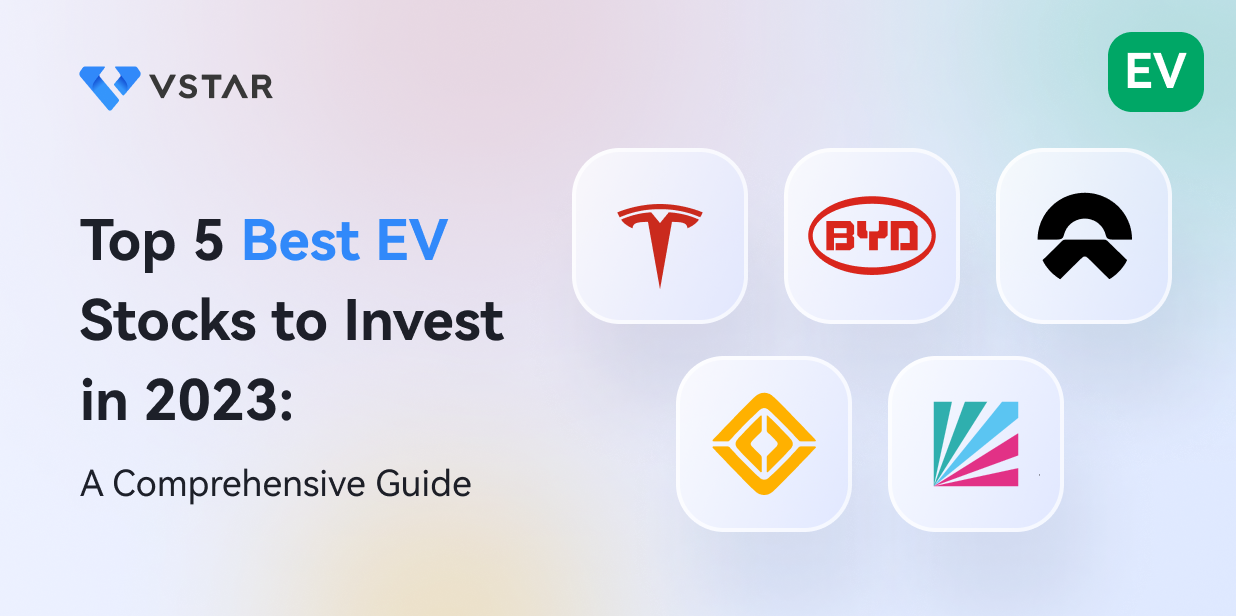Electric vehicles (EVs) are the future of transportation. They offer many benefits, such as lower emissions and costs, higher performance, and more innovation. But how does one invest in this exciting and fast-growing industry? In this article, we’ll show the top 5 EV stocks to invest in 2023 and the different ways to invest in them. We’ll also explain why trading Tesla Stock (TSLA) CFD with VSTAR is an excellent option for investors who want to take advantage of the opportunities in the EV market.

What are EV Stocks?
Electric vehicles (EVs) run entirely or partially on electricity. Unlike conventional vehicles that use fossil fuels, EVs use an electric motor powered by a battery or a fuel cell. EVs can be cars, trucks, buses, motorcycles, scooters, trains, planes, boats, and even spacecraft.
EV stocks are companies producing, developing, or distributing EVs and related technologies. These include EV manufacturers, battery makers, charging station providers, and suppliers of EV components. EV stocks attract investors because they represent a fast-growing and innovative transportation industry sector.
Why are EV Stocks Attractive?

The EV industry has been experiencing rapid growth in recent years, driven by increasing demand, government support, technological advancements, cost competitiveness, and environmental benefits. According to a report by Deloitte, global sales of passenger EVs reached 3.1 million in 2020, up 43% from 2019 and should reach about 10.5 million in 2023. The report also projected that by 2040, EVs would account for 58% of new passenger car sales and 31% of the global car fleet. Here are some factors contributing to the growth of the EV industry:
● Increasing Demand/Growth Potential
Various factors such as consumer preferences, environmental awareness, social status and lower operating costs drive EV demand. The growth potential is incredibly high in emerging markets such as China, India and Brazil, where EV adoption is still low but rising fast. According to a report by Allied Market Research, the EV market is to grow at a compound annual growth rate (CAGR) of 21.1% from 2020 to 2027, reaching $802.81 billion by 2027.
● Government Support
EVs offer environmental benefits such as reducing air pollution, noise pollution, and greenhouse gas emissions from transportation. Many governments worldwide have been providing incentives and regulations to promote EV's adoption. These include subsidies, tax credits, rebates, exemptions, mandates and standards for EVs and charging infrastructure. For example, in the US, the Biden administration has proposed to invest $174 billion in the EV industry as part of its infrastructure plan.
● Technological Advancements

The EV industry has been witnessing significant technological improvements in areas such as battery technology, charging infrastructure, autonomous driving, and vehicle design. These have helped to increase the performance, efficiency, safety, and affordability of EVs and make them more appealing to consumers. For instance, Tesla has been leading the innovation in battery technology with its Battery Day event in 2020, where it announced its plans to produce cheaper and more powerful batteries for its EVs.
● Cost Competitiveness
The cost of owning and operating an EV has declined over time due to factors such as economies of scale, lower maintenance costs, cheaper electricity, and lower fuel costs. According to a report by Deloitte, the total cost of ownership (TCO) of an EV will reach parity with that of an internal combustion engine (ICE) vehicle by 2022 in Europe and by 2025 in China and the US.
● Competitive Landscape
The EV industry has a diverse and dynamic competitive landscape, with established and new entrants vying for market share. Some of the leading EV manufacturers include Tesla, BYD, Nio, Rivian, and Lucid, which have different strengths and strategies in terms of product offerings, innovation, branding, and customer experience. The competition among EV players should intensify as more models become available and consumer preferences evolve.

The prospect of investing in the EV industry is highly promising because the EV industry is very innovative and rapidly growing. So, what are the best EV stocks to invest in right now?
Top 5 Best EV Stocks to Invest in 2023
Many EV companies are in the market, but not all are worth investing in. We have selected the top 5 EV stocks based on their market position, product quality, innovation capability, financial performance and growth potential. These are the EV stocks that we believe will outperform the market and deliver solid returns for investors in 2023 and beyond.
Tesla Stock (NASDAQ: TSLA)
Tesla is undoubtedly the undisputed leader and pioneer of the EV industry, with a market capitalization of $585 billion as of April 2023. The company produces and sells a range of EV models, such as the Model 3, Model Y, Model S, and Model X, as well as other products and services related to energy generation and storage. Tesla also has a strong presence in the autonomous driving and battery technology fields, with its Full Self-Driving (FSD) software and its Battery Day innovations.

Tesla’s financial performance and growth potential are impressive, despite facing challenges such as supply chain bottlenecks, competition, and regulatory issues. The company reported a record revenue of $81.46 billion and a net income of $12.583 billion for the fiscal year 2023, up 51% and 127.79%, respectively, from the previous year. The company also delivered a record 1.3 million vehicles in 2022, up 40% from 2021. Tesla expects a 50% average annual growth rate in vehicle deliveries over a multi-year horizon.
Tesla’s stock price has been volatile but generally trending upward over the past year, reaching $214.24 in February 2023. The stock has a consensus analyst rating of “Buy” and a price target of $212.89, which implies an 8.45% upside potential from its current price of $192.71 as of April 3, 2023.
Tesla is a top EV investment option because of its prospects, its dominant position in the EV market, its innovation capabilities, and its loyal customer base.
BYD Stock
BYD is a Chinese company that’s one of the largest EV manufacturers in the world. The company produces and sells a variety of EVs, including passenger cars, buses, trucks, and forklifts, as well as batteries, solar panels, and other renewable energy products. BYD has a strong presence in domestic and international markets, with customers in over 50 countries and regions.

BYD’s financial performance and growth potential are solid, despite facing some headwinds, such as the Covid-19 pandemic, competition, and policy changes. The company reported a revenue of $61.72 billion and a net profit of $2.4 billion for the fiscal year 2022, up 96.2% and 444.9%, respectively, from the previous year. The company also delivered 1.86 million vehicles in 2022, beating Tesla in EV sales which is the crazy part.
BYD’s stock price has been fluctuating but generally rising over the past year, reachi$44.29 in February 2023. The stock has a consensus analyst rating of “Buy” and a price target of $32.67, which implies a 14.6% upside potential from its current price of $28.49 as of April 3, 2023.
BYD is a top EV investment option because of its diversified product portfolio, its leading position in the Chinese EV market, its technological strengths, and its global expansion strategy.
Nio Stock (NYSE: NIO)
Nio is a Chinese company, a leading EV manufacturer in China, and a significant rival of Tesla. The company produces and sells premium EV models, such as the ES6, ES8, EC6, and ET7, and offers innovative services such as battery swapping, charging solutions, and autonomous driving. Nio also has a strong brand image and a loyal customer community.

Nio’s financial performance and growth potential are robust, despite going through challenges like chip shortage, competition, and regulatory uncertainty. The company reported a revenue of $7.143 billion, up 25.97% from the previous year. The company also delivered 31,041 vehicles in Q1 of 2023, up 20.46% from Q1 of 2022.
Nio’s stock price has fluctuated but generally declined over the past year, reaching a low of $8.03 in March 2023. The stock has a consensus analyst rating of “Buy” and a price target of $14.73, which implies a 63.5% upside potential from its current price of $10.51 as of April 3, 2023.
Nio is a top EV investment option because of its strong growth prospects, its competitive position in the Chinese EV market, its innovative capabilities, and its customer loyalty.
Rivian Stock (NASDAQ: RIVN)
Rivian is a US-based company and one of the most promising newcomers in the EV industry. The company produces and sells electric pickup trucks and SUVs, such as the R1T and the R1S, and develops an electric delivery van for Amazon. Rivian also has the vision to create an adventure network of charging stations and services for its customers.

Rivian’s financial performance and growth potential are promising, despite being a pre-revenue company that has not yet delivered any vehicles to customers. The company went public in November 2021 with an initial public offering (IPO) valued at $66.5 billion, making it one of the most valuable EV companies in the world. The company raised $11.9 billion in funding from investors such as Amazon, Ford, T. Rowe Price, and BlackRock.
Rivian’s stock price has been volatile but generally falling over the last year, with its current price at $15.26 as of April 3, 2023.
Rivian is a top EV investment option due to its vast market opportunity, its partnership with Amazon and Ford, its product differentiation, and its brand appeal.
Lucid Stock (NASDAQ: LCID)
Lucid is another US-based company and one of the ambitious challengers in the EV industry. The company produces and sells luxury EV sedans, such as the Lucid Air, which claims to have the most extended range and fastest charging speed among EVs. Lucid also plans to launch other EV models, such as an SUV and a crossover, in the future.

Lucid’s financial performance and growth potential are optimistic. The company merged with a unique purpose acquisition company (SPAC) called Churchill Capital Corp IV in July 2021 with a deal valued at $24 billion. The company also secured $4.4 billion in cash from the merger to fund its operations and expansion. Lucid’s group in Arizona currently has a production capacity of 34,000 vehicles per year which should increase to 90,000 vehicles per year in 2024 after the launch of the second assembly line meant for producing Lucid Gravity SUV.
Lucid’s stock price has been erratic but generally falling since its merger, reaching a low of $6.09 in January 2023. The stock has a consensus analyst rating of “Buy” and a price target of $9.64, which implies a 17.70% upside potential from its current price of $7.94 as of April 3, 2023.
Lucid is a top EV investment option because of its high-end product quality, its technological innovation, its production capacity and its market potential.
How to Invest in EV Stocks

There are different ways to invest in EV stocks, depending on your risk appetite, investment goals and preferences. Here are three common ways to do this:
● Hold the Share
This means buying and owning the stock of an EV company directly. This gives investors the right to receive dividends (if any) and vote on corporate matters. Holding the share also exposes one to the entire upside and downside potential of the stock price movements. This method requires a brokerage account and a long-term investment horizon.
● Option
This means buying or selling a contract that gives an investor the right, but not the obligation, to buy or sell an underlying EV stock at a specified price and date. Here's the deal, investors can use options to hedge their existing positions, speculate on future price movements, or generate income.
But here's the kicker, options are more complex and risky than holding the share, as they involve leverage, time decay, and volatility. This method requires a brokerage account and options trading approval.
● CFD
This means trading a contract for difference that allows investors to speculate on the price movements of an underlying EV stock without owning it. CFDs offer advantages such as leverage, flexibility and diversification for traders who want to take advantage of the opportunities in the EV industry.
Want to know the best part? CFDs are more cost-effective and accessible than holding the share or option, as they don’t involve commissions, fees or minimum deposits. This method requires a trading platform and a short-term trading strategy.
The table below compares some of the key features and differences between CFDs, shares and options:
|
Feature |
CFD |
Share |
Option |
|
Ownership of the underlying |
No |
Yes |
No |
|
Leverage |
Yes |
No |
Yes |
|
Go long and short |
Yes |
Yes (with margin) |
Yes |
|
Available markets |
Global |
Local |
Local |
|
Cost of trading |
Spread only |
Commission + spread + fees |
Commission + spread + fees |
|
Trading hours |
Extended |
Regular |
Regular |
|
Dividends |
Adjusted in price |
Paid in cash |
Adjusted in price |
|
Losses |
Unlimited (with leverage) |
Limited to investment amount |
Limited to premium paid |
|
Voting rights |
No |
Yes |
No |
|
Flexibility |
High |
Low |
Medium |
|
Potential return |
High (with leverage) |
Medium |
High |
Why Trade EV Stocks CFD With VSTAR?


Some of the benefits investors can enjoy from trading EV Stocks CFD with VSTAR include:
● Access to CFDs: VSTAR offers a variety of markets for investors who want to trade CFDs on EV stocks such as Tesla (TSLA), BYD (BYDDF), Nio (NIO), Rivian (RIVN) and Lucid (LCID).
● Low trading cost: On VSTAR, investors enjoy low spreads and no commissions or fees.
● Well regulated, user-friendly and secure app for beginners and pro traders
● Reliable and very fast order execution
Conclusion

We have comprehensively reviewed the top 5 EV stocks to invest in 2023. In summary, EV stocks offer investors an opportunity to participate in a booming and innovative industry with many advantages and opportunities. However, they also come with risks and challenges that require careful research and analysis.
FAQs
Why are EV stocks attractive to investors?
EV stocks are attractive to investors because they represent a fast-growing and innovative sector of the transportation industry that has strong market potential, government support, technological advancements, cost competitiveness and environmental benefits.
How can I invest in EV stocks?
You can invest in EV stocks by buying and owning the stock of an EV company directly, buying or selling an option contract, or trading a CFD contract.
*Disclaimer: The content of this article is for learning purposes only and does not represent the official position of VSTAR, nor can it be used as investment advice.


















